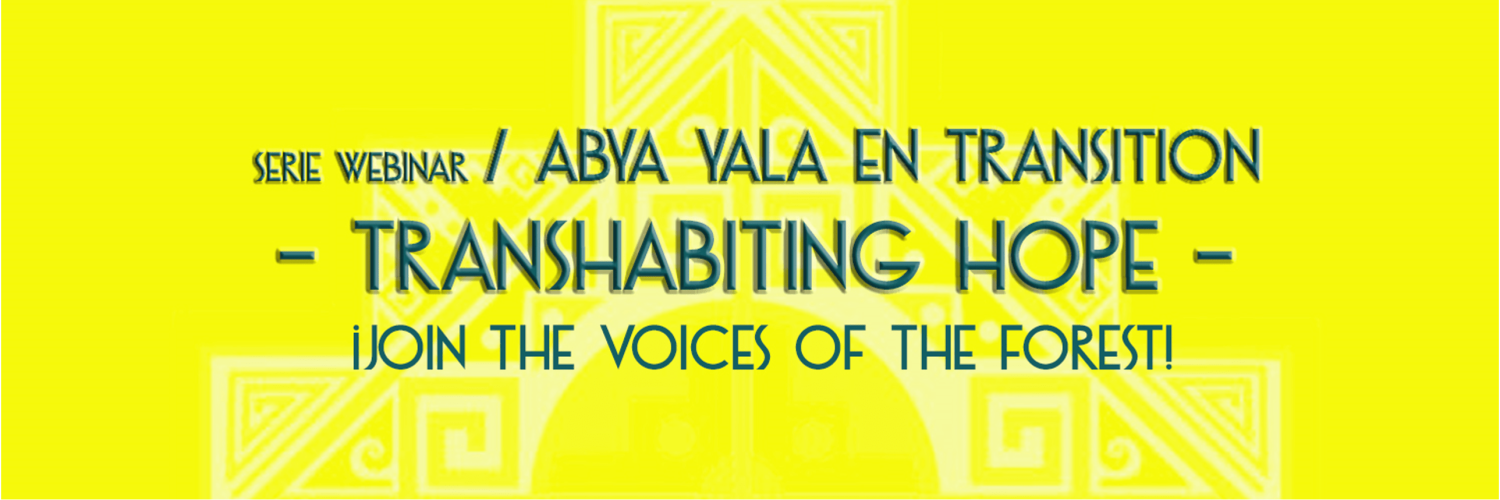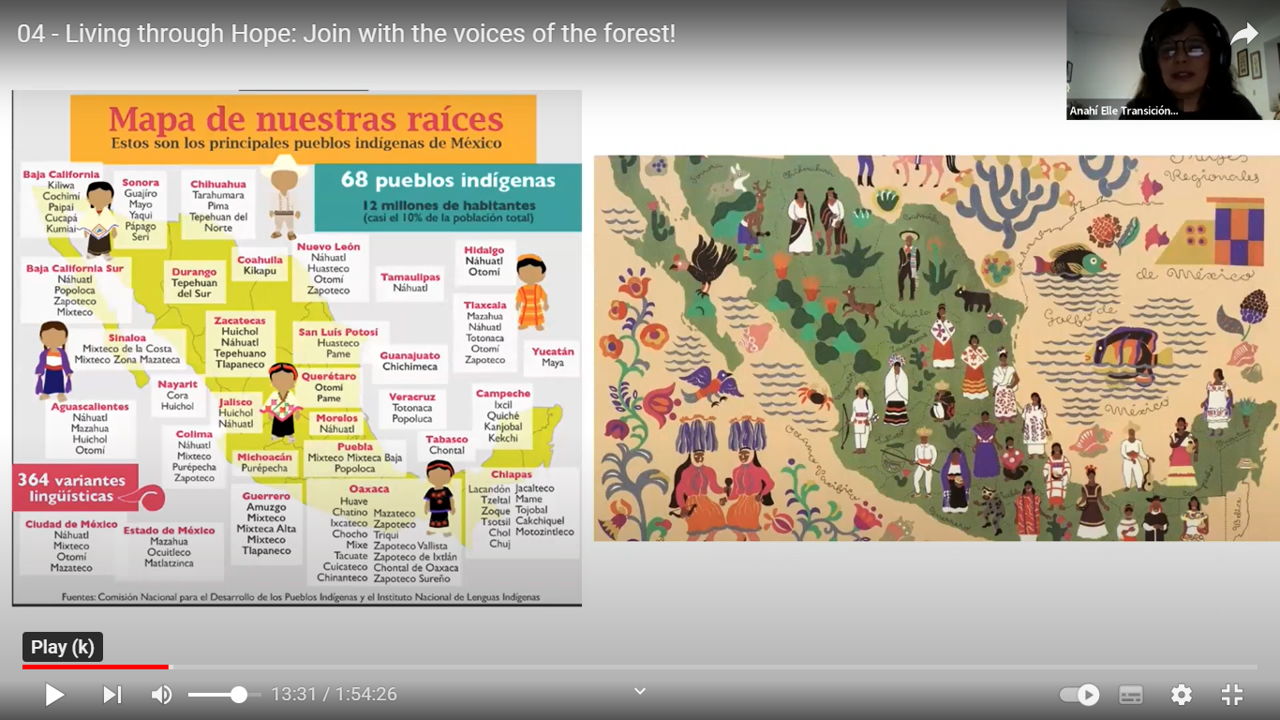
Conversa 4 – Living Through Hope: Join with the voices of the Forest
The fourth conversa in the series of 7 was hosted by Transición Mexico, showcasing diverse communities defending the forest – their territory and culture – working together for a better life.
Watch the video (below) to find out more.
In this video you will hear from:
- The Ve’i Ñuu Savi, or People of the Rain – a group of women weavers who are defending the forests of Mixteca Alta in Oaxaca, Mexico.
- The Union of Cooperatives in Tosepan – a collective of 495 cooperatives who have been organizing for 45 years in the Sierra Nororiental in Puebla, Mexico.
- The Zurciendo el Planeta (Mending the Planet) project – a Latin American collective of embroiderers working together to create a Forest of Hope which is now touring the continent.
In hearing these stories, we empathised with and learnt from the experience of these communities – of the struggles which unfortunately are commonplace across Abya Yala, but also we learnt about how communities are successfully coordinating to address these struggles to fight for the protection of their culture, land and way of life.
You can watch the recording of the whole event here (in Spanish):

Here is a summary of what you will find in the video:
Anahi Martinez Encinas gave an introduction to Mexico and its context. Mexico has a huge variety of climates and ecosystems and is one of the most biodiverse countries in the world, with many protected areas. Demonstrating this diversity, Anahi explained that there are 17 million indigenous people (15% of the population) in Mexico, across nearly 70 towns with nearly 70 languages spoken and even more dialects, and a huge number of archaeological sites.
Transition Mexico has around 15 Transition initiatives in the country. Here, you will find a huge diversity of projects too – focused on education, community events, promoting initiatives across the country and beyond, reconomy, local currency and more. Some of the most active projects include
- Bosquealdea – a book for children and anyone who wants an introduction to alternative economies,
- Herramientas Agiles – an online course to help with grassroots action.
- Repair Café
- Cmmunity gardens.
- Map of the Future – a map in which you can visit projects, watch videos and explore what’s happening in Mexico.
Anahi acknowledged that it is at times dangerous to be an environmental activist in defense of territories in Mexico.
The idea of the conversa was to give a flavour of what these communities are doing to defend their culture and lands, both the struggle and the celebration.
Florina Mendoza Jímenez of the Ve’i Ñuu Savi Collective, (House of the Rain Nation), and the Indigenous Future Network
Florina gave more context, explaining that as in many countries, communities in Mexico are not only defending their lands, but also their languages, and that to do so, many communities are making links and alliances across communities to strengthen their voice. This amplification and storytelling shows the progress being made, and promotes the reality that another way of life is possible.
The last few decades has seen the rise of neo liberalist governments not only in Mexico and this way of governing is a threat to indigenous communities. In Mexico, mining and megaprojects are redefining territories (often without permission) and extracting resources for the global market, while having a damaging local effect.
However, there is action and there is hope. Florina gave the example of Maria de Jesus Patricio Martinez, also known as Marichuy, She was chosen as the representative indigenous spokeswoman by the National Indigenous Congress for the 2018 election and she ran as an independent candidate for the Presidency of Mexico. This is an example of how grassroots alternatives are demanding political change from the ground up, and rising up to stand for diverse communities.
Ilse Riaño Paz from Oaxaca, Mexico gave a firsthand account of her experience in defence of territory. Ilse and her community are currently displaced, and she is living in a hostel away from her home. She talked how important their territory and the forest is, because of its history and for its medicinal plants.
Seven months ago, Ilse and her community were attached by armed groups, who burned the houses in her town, forcing people to leave. This armed group attached three communities, leaving three dead and three disappeared. Ilse and some of the residents are now struggling in a hostel, living in bad conditions with little food or support from the government. They are planting seeds to grow some food to eat – radish, lettuce, tomato – and also to sell. They have set up a school for the children.
The local government hasn’t even visited and it has been local initiatives who have offered help. Florina is a representative of one of the organisations who have offered help, linking them up with local iniativaes, to help with food, education and water.
Florina has helped to organize them / link them with iniatives and support. Not just for food and education, but also water. Together they will continue to fight for justice and the return of their lands.
We then met Paulina Garrido Bonilla from the Union de Cooperativas Tosepan, based in the Puebla region of Mexico.
The Tosepan Cooperative Union was set up 45 years ago in 1977. The union is made up of 495 local cooperatives, involving 47,500 people, of which 78% are from indigenous communities and 64% are women. The Union’s goal is to help to improve the quality of life for individuals and their families through organized work.
Paulina showed how the Union is organized with representatives from each cooperatives, working in groups around themes, such as eco-tourism, health, coffee, honey, bamboo, finances. They also run a training centre, a community radio station and a foundation with offers support for education, housing, health and culture.
The Union aims to help cooperatives, individuals and families in:
– A stable home and healthy food.
– Strengthen alliances so they can diversify their income
– Offer training to constantly develop skills and talents
– Protect local language and identity via education and celebration
– Create spaces of reflection where men and women can live in equality together.
– Defend territories at risk from mining and energy projects
You can find more information about the Union de Cooperativas Tosepan here – https://www.tosepan.com/
We then met Dora Napolitano representing “Zurciendo el Planeta” (Mending the Planet). Mending the Planet started from a series of workshops teaching people how to repair and make use of old clothes and fabrics. The project has since developed into a Latin America-wide collective of embroiderers.
Dora explained that during the pandemic, the project offered virtual workshops around themes including recycled materials, urban gardens, artivist crafts and mending. As the pandemic restrictions started lifting, the group decided to create an embroidered forest of 154 trees from all across the continent, which was taken to COP in Glasgow. The Forest of Hope is now on tour through Latin America, bringing people together to consider how humanity could work better in community like a forest, protecting the natural resources around us.
Dora explained that the Mending the Planet community is growing and that individuals are finding it to be a place of support for people who care deeply about the planet’s resources and future. They meet every week and even though they don’t all meet in person, the community is sharing experiences and nourishing each other.
To find out more about the Transition Movement, projects and initiatives in Mexico, visit www.transicionmexico.org or follow Transición Mexico on Facebook or Instagram.
Leave a comment